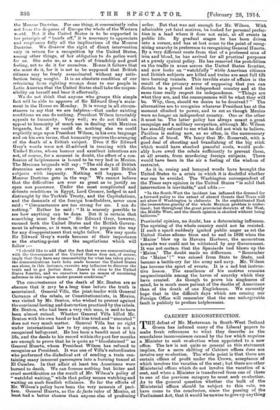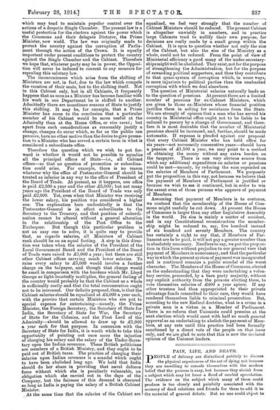CABIN - ET RECONSTRUCTION.
THE defeat of Mr. Masterman in South-West Bethnal Green has induced many of the Liberal papers to make fresh references to what they describe as the scandalous inconvenience caused by the law which requires a Minister to seek re-election when appointed to a new office. The law is not quite so general as this statement implies, for a mere shifting of Cabinet offices doeS not involve any re-election. The whole point is that there are certain offices of profit under the Crown, acceptance of which involves the vacation of the seat; but there are other Ministerial offices which do not involve the vacation of a' seat, and when a Minister is transferred from one of these' to one of the previous category he must seek re-election. As to the general question whether the bulk of the Ministerial offices should be subject to this rule, we have come to the conclusion, since the passing of the Parliament Act, that it would be unwise to give up anything
which may tend to maintain popular control over the actions of a despotic Single Chamber. The present law is a useful protection for the electors against the power which the Commons and their delegate Dictator, the Prime Minister, now wield. The law was originally made to protect the country against the corruption of Parlia- ment through the action of the Crown. It is equally important under present conditions to protect the country against the Single Chamber and the Cabinet. Therefore we hope that, whatever party may be in power, the Opposi- tion will never be induced to consent to any measure for repealing this salutary law. The inconveniences which arise from the shifting of Ministers are not, in fact, due to the law which compels the vacation of their seats, but to the shifting itself. Not in this Cabinet only, but in all Cabinets, it frequently happens that as soon as a Minister has become familiar with his work in one Department he is shifted to another. Admittedly there are sometimes reasons of State to justify this shifting. It may be, for example, that a Prime Minister has come to the conclusion that a particular member of his Cabinet would be more useful at the Admiralty than at the Home Office, or vice verso.; but apart from such considerations as reasonably justify a change, changes do occur which, so far as the public can perceive, have no other motive than the desire to give promo- tion to a Minister who has served a certain term in what is considered a subordinate office.
Therefore the question which we wish to put for- ward is whether it would not be possible to equalize all the principal offices of State—i.e., all Cabinet offices—so that no question of promotion or subordina- tion could arise. For example, there is no reason whatever why the office of Postmaster-General should be treated as inferior in any way to the office of President of the Board of Trade. At present, as it happens, one office is paid £2,500 a year and the other £5,000; but not many years ago the President of the Board of Trade was only paid £2,000. Yet, even when that Minister was receiving the lower salary, his position was considered a higher one. The explanation here undoubtedly is that the Postmaster-General is in effect subordinate to the Secretary to the Treasury, and that position of subordi- nation cannot be altered without a general alteration in the relationship of the Post Office to the Exchequer. But though this particular problem is not an easy one to solve, it is quite easy to provide that, as regards salaries, all Ministers of Cabinet rank should be on an equal footing. A step in this direc- tion was taken when the salaries of the President of the Local Government Board and the President of the Board of Trade were raised to £5,000 a year ; but there are still other Cabinet offices carrying much lower salaries. To raise every salary to £5,000 would involve a further charge on the taxpayer, and though that charge would be small in comparison with the burdens which Mr. Lloyd George so light-heartedly multiplies, the general feeling of the country would probably be that the Cabinet as a whole is sufficiently costly and that the total remuneration ought not to be increased. Our definite proposal, then, is that the Cabinet salaries should be equalized at £4,000 a year each, with the proviso that certain Ministers who are put to special expense for entertaining—namely, the Prime Minister, the Foreign Secretary, the Secretary of State for India, the Secretary of State for War, the Secretary of State for the Colonies, and the First Lord of the Admiralty—should be allowed to draw up to £1,000 a year each for that purpose. In connexion with the Secretary of State for India, it is worth while to take this opportunity of pointing out once more the injustice of charging his salary and the salary of the Under-Secre- tary upon the Indian revenues. These British politicians are members of a British Ministry, and they ought to be paid out of British taxes. The practice of charging their salaries upon Indian revenues is a scandal which ought to have been abolished long ago. We hold that India should do her share in providing that naval defence force without which she is peculiarly vulnerable, an obligation which she carried out in the days of the Company, but the fairness of this demand is obscured so long as India is paying the salary of a British Cabinet Minister.
At the same time that the salaries of the Cabinet are equalized, we feel very strongly that the number of Cabinet Ministers should be reduced. The present Cabinet is altogether unwieldy in numbers, and in practice large Cabinets tend to nullify their own purpose, for decisions are really made by a small group within the Cabinet. It is open to question whether not only the size of the Cabinet, but also the size of the Ministry as a whole, could not be reduced. From the point of view of Ministerial efficiency a good many of the under-eecretary- ships might well be abolished. They exist, not for the purpose of strengthening the Administration, but for the purpose of rewarding political supporters, and thus they contribute to that quasi-system of corruption which, in some ways, is more injurious to political parties than the unabashed corruption with which we deal elsewhere.
The question of Ministerial salaries naturally leads on to the question of pensions. At present there are a limited number of pensions for ex-Cabinet Ministers, which are given to those ex-Ministers whose financial position justifies them in asking for assistance from the State. We are strongly of opinion that a man who has served his country in Ministerial office ought not to be liable to be reduced to penury by a change of Government, and there- fore it is most desirable that the number of Ministerial pensions should be increased, and, further, should be made automatic. If expense is pleaded against our proposal that every Cabinet Minister who has held office for six years—not necessarily consecutive years—should have a pension of £1,500 a year, we may point to a method of obtaining the money without any extra burden on the taxpayer. There is one very obvious source from which any additional expenditure on salaries or pensions could be met—namely, by reducing the sum expended on the salaries of Members of Parliament. We purposely put the proposition in this way, not because we believe that the payment of Members of Parliament is justified or because we wish to see it continued, but in order to win the assent even of those persons who approve of payment of Members.
Assuming that payment of Members is to continue, we contend that the membership of the House of Com- mons might usefully be cut down. At present the House of Commons is larger than any other Legislative Assembly in the world. Its size is mainly a matter of accident, and in any Constitutional reconstruction the member- ship might be reduced to, say, five hundred instead of six hundred and seventy Members. The country has certainly a right to say that, if Members of Par- liament are to be paid, it will not pay a greater number than is absolutely necessary. Needless to say, we put the proposi- tion in this form without prejudice to our general view that payment of Members is unnecessary, and that the particular way in which the present system of payment was inaugurated and is continued remains a public scandal of the worst character. The Members of the House of Commons, elected on the understanding that they were undertaking a volun- tary service, proceeded, by a bare party majority, without any explicit authority from the persons electing them, to vote themselves salaries of £400 a year apiece. if any other trustees had thus appropriated to their private advantage funds committed to their care, they would have rendered themselves liable to criminal prosecution. But, according to the new Radical doctrine, what is a crime in a private man is a virtue in a Member of Parliament. There is no reform that Unionists could promise at the next election which would meet with half so much general approval as an undertaking to abolish the payment of Mem- bers, at any rate until this practice had been formally sanctioned by a direct vote of the people on that issue only, and we are glad to note that this is now the declared opinion of the Unionist leaders.















































 Previous page
Previous page